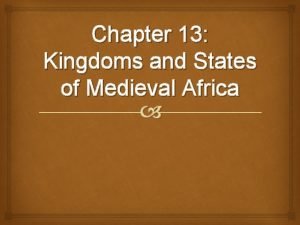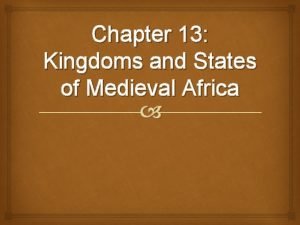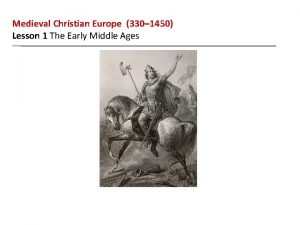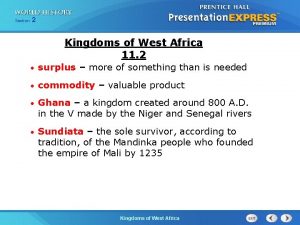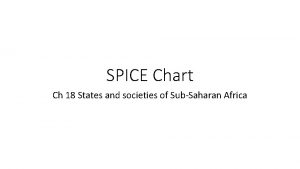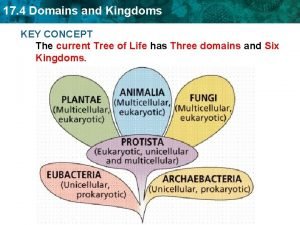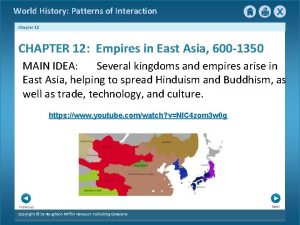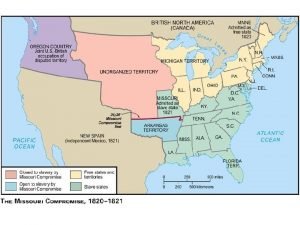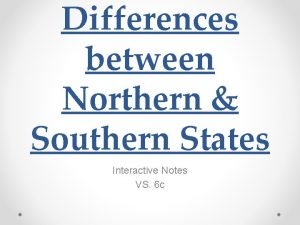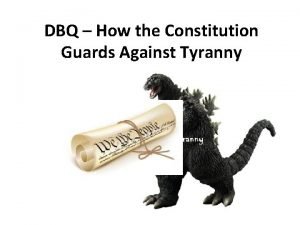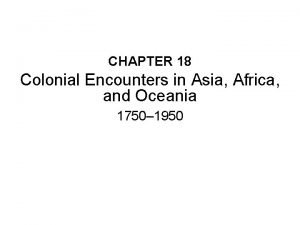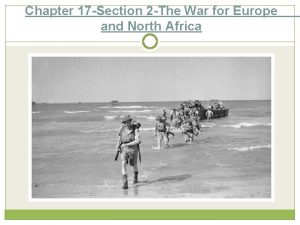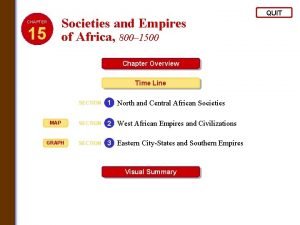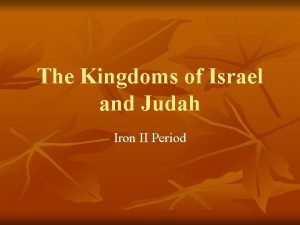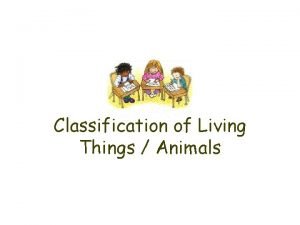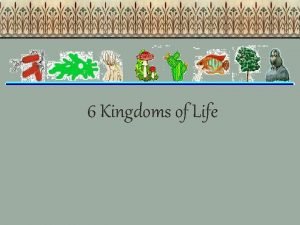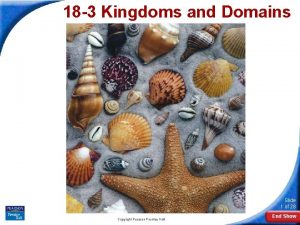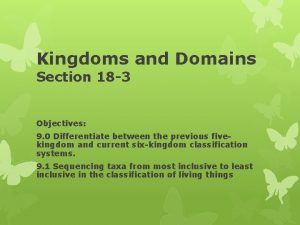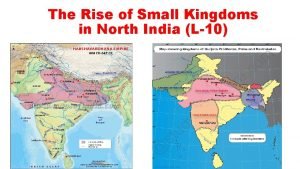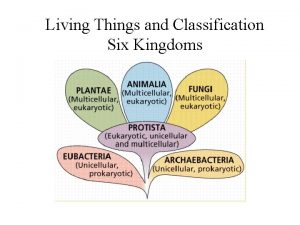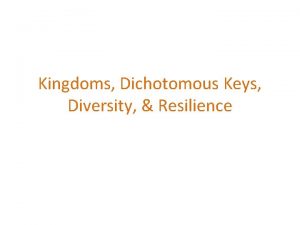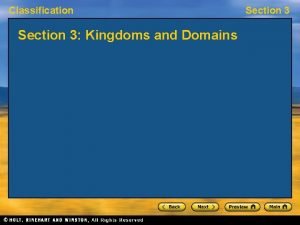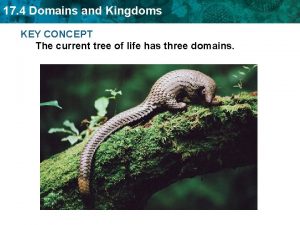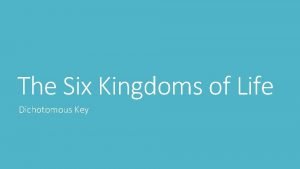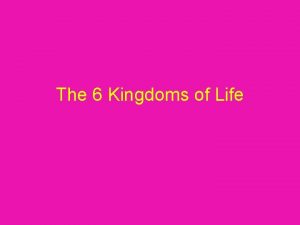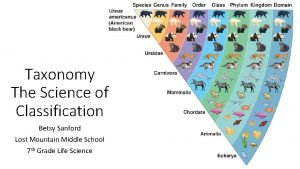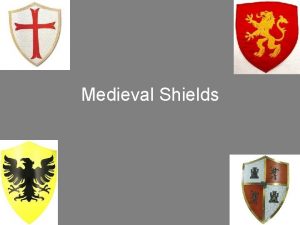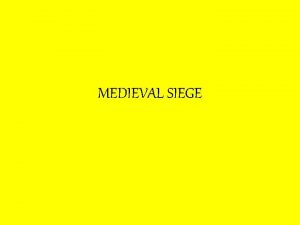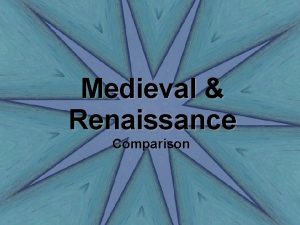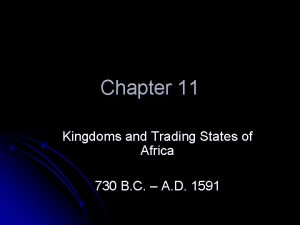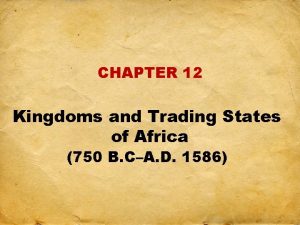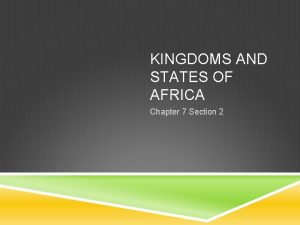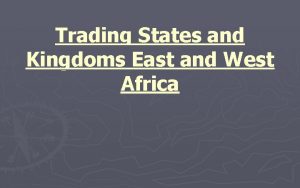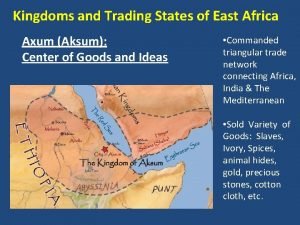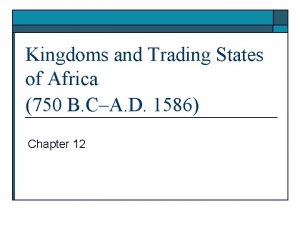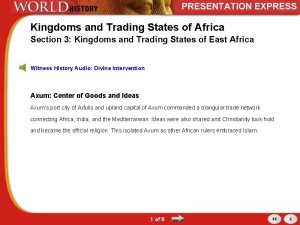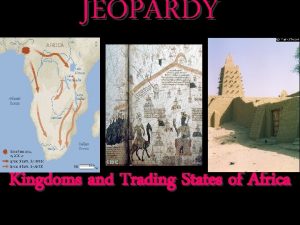Chapter 13 Kingdoms and States of Medieval Africa




































- Slides: 36

Chapter 13: Kingdoms and States of Medieval Africa

Geography of Africa • What is the geography of Africa like? • What are some positive aspects of Africa’s geography? • What are some negative aspects of Africa’s geography?

Impact of Geography Africa is the second largest continent Africa stretched 5, 000 miles north to south 3 different regions: North- Sahara Central- Green band of rain forests and tropical grassland South- Dry land

Impact of Geography Heavy rains near the equator Largest populations are concentrated where soils are fertile Savanna- broad grassland with small trees and shrubs There is not enough rainfall for farming or herding

African Society Three early societies: Ghana, Mali, Songhai The three societies had things in common: government, trade centers, towns had artisans of metal work, woodwork, potters, and other crafts Most African societies did not have written languages The language spoken throughout most of Africa was Swahili

Family and Lineage Most Africans lived in small villages Individual identity was determined by their membership in an extended family and lineage group Lived in extended families- parents, children, grandparents, other family dependents Lineage groups- an extended family unit that has combined into a larger community Matrilineal Patrilineal

Family and Lineage Power was shared among members of the community Decisions were made by consensus Elders were respected Independent villages organized by clans

Religious Beliefs Monotheistic Yoruba people of Nigeria- chief god sent his son Oduduwa down from heaven Ashanti people of Ghana believed in the supreme being Nyame Africans used rituals to communicate with the gods Diviners- a person who is believed to have the power to foretell events Importance placed on ancestors

Religious Beliefs Believed that the spirits of their departed ancestors were present on earth- animism Music and dance were for religious purposes Lyrics of songs conveyed religious traditions, folk legends, and historical information from one generation to another

Religious Beliefs African religious beliefs were challenged by Islam but not always replaced Islam came into northern Africa Islam was adapted through trade By 1400 s- most of the populations accepted Islam Christianity was adopted by Axum Muslims and Christians came into conflict


Role of Women were subordinate to men The value of a woman was in her ability to bear and raise children Women often worked in fields

The Role of Government Early societies governments regulated trade Government had more power than private merchants To what degree do governments regulate or control economic markets?

Types of Government Free Market Economy- an economic system in which the means of production are largely privately owned and there is little or no government control over the markets Supply and Demand- the relationship between the amounts of an item that producers are able and willing to sell (supply) and the quantity that consumers can afford and wish to buy

Types of Governments Money Economy- an economic system based on money rather than barter Mercantilism- a set of principles that dominated economic thought in the 1600 s

Major Trade Route Move of goods all over the world Developed trade diasporas- networks of interconnected commercial communities living and working in major trade cities

Arab Trading Zone Across the Indian Ocean to Northern Africa Allowed trade between Asia and East Africa Trading centers developed Mogadishu and Great Zimbabwe thrived on trade across the Indian Ocean Muslim ports in Egypt- Cairo and Alexandria

East African Kingdoms Kush Grew out of the region that was known as Nubia, south of Egypt and Nubia traded ivory, leopard skins, and frankincense Assyrians defeated Kush because the Assyrians had superior technology

East African Kingdoms Axum Invaded and conquered Kush Axum came into conquered with Greek and Rome civilizations through missionaries and trade Adopted Christianity Trade Located along the Red Sea Weakened by civil war and declined

West African Kingdoms Gold and salt were important to trade Plenty of salt was found in the Sahara Very little salt found in savanna People of savanna traded gold to obtain salt West African kingdoms were ruled by powerful emperors

West African Kingdoms They had strong armies to maintain order and protect kingdoms Gold, ivory, and slaves moved north Metal ware, textiles, and salt carried south


The Berbers Nomads- carried goods across the Sahara Berbers often purchased goods from people on one side of the desert and then sold the goods to people on the other side

City: Jenne-Jeno First known indigenous city of Sub-Saharan Africa Began 250 BC Herding and fishing Used what was around them: Fish from the river, rice from the fields, beef from the herds Did not have centralized government- urbanized

Ghana Emerged around 6 th century Between Sahara and West African coast Between Senegal and Niger Rivers People of Ghana made iron swords, spears, and lances Kings ruled Ghana as powerful rulers unbound by laws Taxed all trade Capital: Kumbi Saleh

Ghana’s Prosperity Ghana’s gold was at the center of trade Merchants traded salt, textiles and other goods for gold Main export: gold; main import: salt 1076 - invaded by Muslims from North Africa Never fully recovered and dissolved into several smaller states

Mali Founded by Sundiata Keita Began after the collapse of Ghana Sundiata Keita united people of Mali and established a stable central government Powerful kings were called mansas

Mali Trade Major trading city: Timbuktu was a trading and education center Recognized as one of the intellectual capitals of the Muslim world City attracted students from Europe, Asia, and Africa Arab travelers like Ibn Battuta- impressed by Mali’s wealth

Mansa Musa One of the greatest African leaders Doubled the size of the kingdom Created a strong central government Divided the kingdom into provinces ruled by governors he appointed Made a pilgrimage to Mecca in 1324

Mansa Musa Traveled in a caravan with gold Brought back Muslim scholars and architects to Mali Built mosques and libraries After Mansa Musa’s death, Mali fell into a civil war

Songhai Location: Fertile area near the Niger River Most people made their livings as farmers

Sunni Ali 1464: Sunni Ali created a dynasty based on Sunni Islam Strong military leaders captured Timbuktu and made it a great trading empire Gold and salt were key

Muhammad Ture Height of Sunni power was under Muhammad Ture Strong military leaders Created strong government bases Established a navy on the river Capital is Gao is where Ture is burried Gao has one of the most revered mosques in western Africa

Muslim Trade Outposts Starting in the 700 s- Muslim traders from Arab lands established bases on the east coast of Africa Muslims moved from Arabian peninsula to East Africa Along with their trade goods, Arabs carried their culture and religion to port cities

Port of Kilwa Along the East Coast of Africa Gold from the interior was sent down the Zambia river, sold to merchants from Arabia and India Kilwa, present day Tanzania, was filled with magnificent buildings Portuguese destroyed the city in the early 1500 s

Societies in South Africa Up to the 11 th century, people in southern Africa lived in groups of independent villages Group of independent villages organized by clans Some villages began to unite, initiating the development of states
 Chapter 13 kingdoms and states of medieval africa
Chapter 13 kingdoms and states of medieval africa Chapter 13 kingdoms and states of medieval africa
Chapter 13 kingdoms and states of medieval africa Medieval africa geography
Medieval africa geography Medieval kingdoms in europe lesson 1
Medieval kingdoms in europe lesson 1 How did the kingdoms of west africa develop and prosper
How did the kingdoms of west africa develop and prosper Africa spice chart
Africa spice chart Medieval africa geography
Medieval africa geography Chapter 17 section 3 domains and kingdoms
Chapter 17 section 3 domains and kingdoms Concept mapping domains and kingdoms
Concept mapping domains and kingdoms Chapter 12 section 5 kingdoms of southeast asia and korea
Chapter 12 section 5 kingdoms of southeast asia and korea What were the 11 free states
What were the 11 free states Southern states of america
Southern states of america How does the constitution guard against tyranny
How does the constitution guard against tyranny Chapter 18 colonial encounters in asia and africa
Chapter 18 colonial encounters in asia and africa Chapter 17 section 2 the war for europe and north africa
Chapter 17 section 2 the war for europe and north africa Chapter 17 section 2 the war for europe and north africa
Chapter 17 section 2 the war for europe and north africa Ap world history chapter 25 africa and the atlantic world
Ap world history chapter 25 africa and the atlantic world Chapter 15 societies and empires of africa
Chapter 15 societies and empires of africa Domains and kingdoms
Domains and kingdoms Kingdoms of israel and judah
Kingdoms of israel and judah Kingdoms of life
Kingdoms of life I am covered in dry scales and i lay eggs. what am i?
I am covered in dry scales and i lay eggs. what am i? Chapter 17 section 1 the history of classification
Chapter 17 section 1 the history of classification Kingdoms of life chart
Kingdoms of life chart Section 18-3 kingdoms and domains
Section 18-3 kingdoms and domains Section 18-3 kingdoms and domains
Section 18-3 kingdoms and domains Flow chart of domains and kingdoms
Flow chart of domains and kingdoms How are organisms classified into domains and kingdoms
How are organisms classified into domains and kingdoms Kingdoms of north india
Kingdoms of north india 6 living kingdoms
6 living kingdoms Keys and kingdoms
Keys and kingdoms King phillip came over from great spain
King phillip came over from great spain What are the three domains and six kingdoms?
What are the three domains and six kingdoms? Domains and kingdoms
Domains and kingdoms Dichotomous key for 6 kingdoms
Dichotomous key for 6 kingdoms Cladogram of 6 kingdoms
Cladogram of 6 kingdoms Family order genus species
Family order genus species

